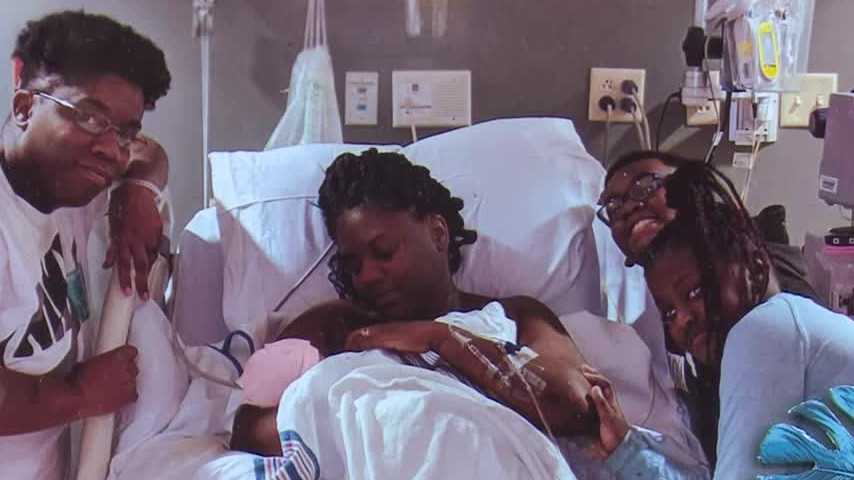
It’s Black Maternal Health Week, a week that raises awareness about the risks Black and other minority women face navigating pregnancy and focusing on postpartum care, too. “It is really important that care is considered after the baby is birthed,” said Louisville Coalition for Black Maternal Health president Cynethia Bethel-Hines. According to the Centers for Disease Control and Prevention, Black women are three times more likely than white women to die from pregnancy-related issues.Doctors believe four out of five of those deaths are preventable, and this Black Maternal Health Week, Louisville Coalition for Black Maternal Health, Norton Healthcare and March of Dimes are shedding light on these disparities through their second annual Black Maternal and Infant Health Symposium. “So part of our big goal is reducing that just disjointed and really caring for people and providing them an easy way through the healthcare system. Building the bridges,” said Mary Schubert, Norton Health System’s vice president of women’s services.One way to build those bridges is also focusing on postpartum care. Doulas are trying to bridge gaps in care.“They’re there for their birth, and then they follow them postpartum,” said Schubert. Kazia Bryant was a doula for 12 years. She’s now focusing on becoming a midwife. She created Mamas to Mamas and works for Black Birth Justice, a nonprofit organization that was created to combat the Black maternal death through postpartum care. She said postpartum care is crucial to Black maternal health because there are things that can be missed, like preeclampsia, postpartum hemorrhages, and blood clots.“So we’re able to relate to them on a different level. It’s not provider patient. It’s doula client, it’s community midwife and client. And so the relationship is more personable and we’re also able to take more time to spend with them, to educate them on the things that are happening with their bodies and their babies,” said Bryant. While their mission is postpartum education, they also offer hands-on resources like clothing diapers and other necessities that the baby and mom need. “We really try to bridge the gap between an emergency or just. Just a need,” said Bryant. One major topic brought up was perinatal mood disorders. “There’s not really a lot of conversation during pregnancy that you could exhibit or experience anxiety after having a baby or, you know, depression and things like that and when they get home, they feel like they have no options. So that’s another reason why postpartum care is really important,” said Bethel-Hines. They encourage mothers to advocate for themselves if they believe they have postpartum depression symptoms.
It’s Black Maternal Health Week, a week that raises awareness about the risks Black and other minority women face navigating pregnancy and focusing on postpartum care, too.
“It is really important that care is considered after the baby is birthed,” said Louisville Coalition for Black Maternal Health president Cynethia Bethel-Hines.
Advertisement
According to the Centers for Disease Control and Prevention, Black women are three times more likely than white women to die from pregnancy-related issues.
Doctors believe four out of five of those deaths are preventable, and this Black Maternal Health Week, Louisville Coalition for Black Maternal Health, Norton Healthcare and March of Dimes are shedding light on these disparities through their second annual Black Maternal and Infant Health Symposium.
“So part of our big goal is reducing that just disjointed and really caring for people and providing them an easy way through the healthcare system. Building the bridges,” said Mary Schubert, Norton Health System’s vice president of women’s services.
One way to build those bridges is also focusing on postpartum care.
Doulas are trying to bridge gaps in care.
“They’re there for their birth, and then they follow them postpartum,” said Schubert.
Kazia Bryant was a doula for 12 years. She’s now focusing on becoming a midwife.
She created Mamas to Mamas and works for Black Birth Justice, a nonprofit organization that was created to combat the Black maternal death through postpartum care.
She said postpartum care is crucial to Black maternal health because there are things that can be missed, like preeclampsia, postpartum hemorrhages, and blood clots.
“So we’re able to relate to them on a different level. It’s not provider patient. It’s doula client, it’s community midwife and client. And so the relationship is more personable and we’re also able to take more time to spend with them, to educate them on the things that are happening with their bodies and their babies,” said Bryant.
While their mission is postpartum education, they also offer hands-on resources like clothing diapers and other necessities that the baby and mom need.
“We really try to bridge the gap between an emergency or just. Just a need,” said Bryant.
One major topic brought up was perinatal mood disorders.
“There’s not really a lot of conversation during pregnancy that you could exhibit or experience anxiety after having a baby or, you know, depression and things like that and when they get home, they feel like they have no options. So that’s another reason why postpartum care is really important,” said Bethel-Hines.
They encourage mothers to advocate for themselves if they believe they have postpartum depression symptoms.


